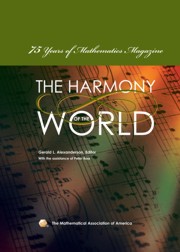Book contents
- Frontmatter
- Introduction
- Contents
- A Brief History of Mathematics Magazine
- Part I The First Fifteen Years
- Perfect Numbers
- Rejected Papers of Three Famous Mathematicians
- Review of Men of Mathematics
- Oslo under the Integral Sign
- Vigeland's Monument to Abel in Oslo
- The History of Mathematics
- Numerical Notations and Their Influence on Mathematics
- Part II The 1940s
- Part III The 1950s
- Part IV The 1960s
- Part V The 1970s
- Part VI The 1980s
- Briefly Noted
- The Problem Section
- Index
- About the Editors
Rejected Papers of Three Famous Mathematicians
from Part I - The First Fifteen Years
- Frontmatter
- Introduction
- Contents
- A Brief History of Mathematics Magazine
- Part I The First Fifteen Years
- Perfect Numbers
- Rejected Papers of Three Famous Mathematicians
- Review of Men of Mathematics
- Oslo under the Integral Sign
- Vigeland's Monument to Abel in Oslo
- The History of Mathematics
- Numerical Notations and Their Influence on Mathematics
- Part II The 1940s
- Part III The 1950s
- Part IV The 1960s
- Part V The 1970s
- Part VI The 1980s
- Briefly Noted
- The Problem Section
- Index
- About the Editors
Summary
Editor's Note: Professor Emch here provides some solace to those who have had a good manuscript rejected or ignored by an editor. After stating that merit should be the only criterion for an editor in deciding whether to publish something, he adds that “there is no other science in which this assertion should appear more evident than in mathematics.” He then describes three important pieces of work by Ludwig Schläfli, Bernhard Riemann, and Ernest de Jonquières that were mishandled by referees and editors who did not understand the work or failed to see its significance.
Professor Emch, an algebraic geometer, had a PhD from the University of Kansas and spent his career at the University of Illinois, Champaign-Urbana. Shortly prior to his contributing this to Mathematics Magazine he had served on the Council of the American Mathematical Society.
Introduction
Every scientifically-minded person agrees with those who hold the opinion that in the appraisement or estimate of the value of an intellectual performance, merit, as acknowledged by one or more class or classes of critics, should be the deciding factor. There is no other science in which this assertion should appear more evident than in mathematics. And yet history records some strange exceptions to this rule, due to the fact that mathematicians also are frequently very human, just like the rest of their scientific brethren.
- Type
- Chapter
- Information
- Harmony of the World75 Years of Mathematics Magazine, pp. 5 - 8Publisher: Mathematical Association of AmericaPrint publication year: 2007

